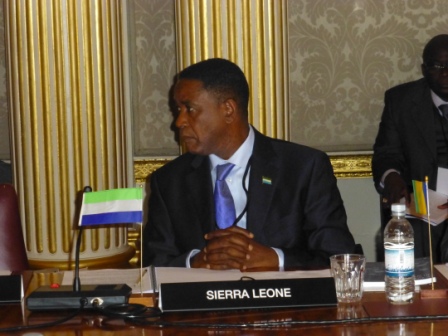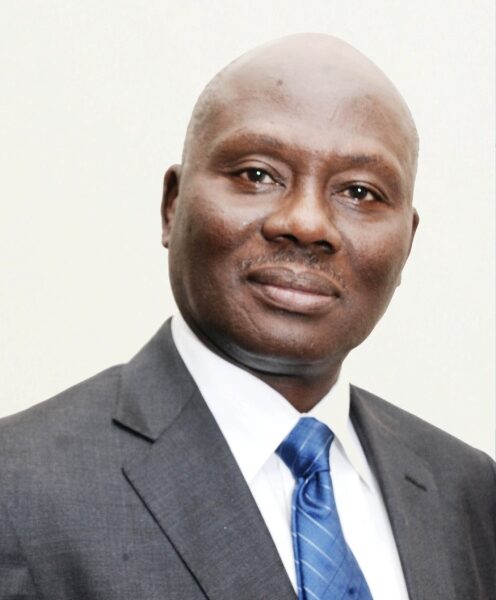The Ernest Koroma administration – What readers must know
I have been following articles and comments from colleague journalists and academics alike, about Sierra Leone’s political and social economic landscape with keen interest. While some of the articles mostly project the images of political desperados who are keen to take power come 2012 elections, others are busy promulgating deceptive criticisms regarding the ongoing development programmes in the country. (Photo: Umaru S. Jah, author)
In as much as I share the views of those writers in providing information to citizens about public and political life, I equally discard the blinkers of prejudices and distrust of some critics who are blind to the truth, especially as Sierra Leone is witnessing visible achievements in several sectors of governance.
However, the purpose of this article is to discount the hyperbole and rhetoric mouthed by extremists that the Ernest Koroma administration has done nothing worth praising.
I will start by giving a prelude of the Koroma government’s overall development strategy and medium-term reform priorities. I will later outline the achievements made so far even in the face of economic duress across the globe. The final part will leave room for the doubting few to decide whether they want to support the Ernest Koromaism before it is too late for them
Strategic Development
When President Koroma was elected in 2007, the country’s socio-economic and infrastructural development was relatively low. This was confirmed by Finance Minister Dr. Samura Kamara in his statement of the economic and financial policies for 2012. He said, ”…..at the onset of this government in September 2007, Sierra Leone was relatively at the low end of several international country performance ratings, including agriculture productivity, in road infrastructure coverage, in power generation and distribution, in telecommunication density, in access to finance, and basic social services as well as in economic and financial governance.”
In an effort to address the aforementioned problems, President Koroma introduced strategic and structural reform processes through the Agenda for Change (which most people misunderstood to be something else) in an effort to reduce poverty through sustained economic growth. Among the key priorities outlined in the Agenda for Change were the enhancement of national electricity supply, infrastructural development, abundant agricultural productivity, and sustainable human development in the country. In addition, good governance, micro-economic stability, private sector development, and proper management of natural resources were the prerequisites to achieve the goals mentioned above.
Immediately after what I have alluded to above, hecklers were busy making ill-informed comments that the President’s pronouncements were nothing but a hoax to have him re–elected for a second term. Contrarily, when dramatic changes in several sectors started taking place, the unbridled dogmatism and blind defence of irrational position of the very critics shamefully dwindled down much like a roaring lion turning out to be a mere pussy cat.
Achievements
Developments ranging from positive economic outlook, infrastructural development, energy and clean water supply systems, access to free health care, transition from subsistence to commercialisation of agriculture for small scale farmers, increased budgetary transfer to local councils, to the establishment of a legal and regulatory framework for investment opportunities speak volumes. The country now enjoys an enviable position in major international country performance rankings. A reverse of government’s priority, placing Agriculture at the top after achieving approximately 70% or more of electricity supply in the country has made significant impact in the country. The empowerment of farmers is not limited only to mechanized and commercialised farming, but also 40% government subsidies to large and small scale farmers across the country are clear indication of government commitment to enhance food security. The list of development programmes within the agricultural sector, education, health and infrastructure is endless.
Sierra Leone’s exports on Minerals have increased tremendously following the commencement of iron ore mining. Despite the global recession, domestic and economic fundamentals of Sierra Leone remain robust with an estimated 5.3 % of GDP growth in 2011. These are clear signs that the country is not only striving to recover from economic decadent, but also heading for sustainable economic growth.
To validate the aforementioned, a July 2011 ADB appraisal report had this to say: “Sierra Leone’s post conflict economic performance remains strong with GDP growth reaching 5.5% in 2008.” The appraisal further disclosed that following the global financial crisis that affects many countries around the globe including Sierra Leone, economic activity has started to rebound. This was attributed to the growth in mining sector, manufacturing and agricultural outputs.
Besides the above-mentioned facts, which I think no rational person can deny, the fight against corruption has become a central hub of government policy. This is why the Anti Corruption Act 2008 was enacted to devolve power to the ACC in an effort for the institution to gain total independence from Government. This move has yielded huge dividends in the fight against corruption. A recent report from the ACC indicates that the Commission has handled 117 cases in 2010, 8 of which have led to convictions involving two government Ministers. The issue to note at this stage is that world leaders including UN Secretary General, Ban Ki-moon, are giving accolades to the Ernest Koroma administration for the successive transformation drive and economic growth.
Not too long ago, Ban Ki moon said: “Sierra Leone is one of the world’s most successful examples of post-conflict recovery, peacekeeping and peace building. The country is a model for peace and development in the region, as well as an example of a multilateral approach to consolidating peace that can be emulated elsewhere.” The multimillion dollar question is what else one can say after such international appraisal?
Perhaps one might find it a bit monotonous to attempt to reiterate government’s achievements in all sectors, but the recent pronouncement of government commitment to pass the Freedom of Information Bill into law, should be considered from a different vantage point. This is because the APC government believes that information abundance is an integral part of today’s world, and no single entity should exert inordinate influence over citizens’ access to information. I therefore, particularly doff my hat to such a bold step.
A Clarion Call
What is now required of us all is collective responsibility from all Sierra Leoneans to join President Koroma for the sake of continuity, progress and above all, to build on the progress he has made so far. We should put personal affiliations aside and put the interest of our country first. We should stop worrying ourselves with unnecessary questions of who will be the next president. In fact, the answer to that question has no significance. Because as far as I know, there is clear evidence and there are glaring examples. The ongoing development programmes by the APC-led government are good indicators of who the next president should be. But, because we believe not only in the people’s choice and also the fundamental principles of democracy, we would like to show the people of Sierra Leone and the world that Ernest Koroma is going to continue his long list of development programmes and encourage a robust opposition in an effort to further improve the country’s socio-economic trend. In fact, this is where the electioneering campaign should be directed if you care to listen – towards a solid opposition that will constructively engage government in their policies and programmes for the public good.
Ernest Koroma has no real competition for the upcoming elections because he has proven to not only the people of Sierra Leone but also the international community that he is the right man that Sierra Leone needs to revamp its social and economic potentials. The 2012 elections are being held as further proof of the APC’s and the people’s commitment to democracy, competence, tolerance and accountability.
By Umaru S. Jah-Berlin
Stay with Sierra Express Media, for your trusted place in news!
© 2012, https:. All rights reserved.






Michael Robson
/
The Ernest Koroma administration – What readers must know: Among the key priorities outlined in the Agenda for C… http://t.co/5wWCh9Qh
18th May 2012